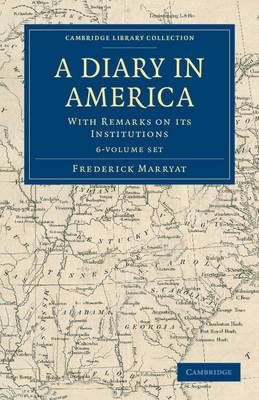Cambridge Library Collection - North American History
4 primary works • 5 total works
Volume 2
Captain Frederick Marryat (1792-1848) was a distinguished naval officer, today best remembered as a novelist (particularly of stories for children), often drawing on his own experiences. He also edited a radical journal, and wrote non-fiction, including an attack on press-gangs, which damaged his career. He spent 1837 and 1838 travelling in North America, publishing his impressions in this unstructured six-volume 'diary' in 1839. He states that the number of contradictory and often trivial accounts of American life being published made him want to see the New World for himself. He found it impossible to make generalisations, given the size of the country and the different origins of new arrivals, and did not believe America would become a nation for many years. Volume 2 covers such topics as language, the prison system and the army.
Volume 3
Captain Frederick Marryat (1792-1848) was a distinguished naval officer, today best remembered as a novelist (particularly of stories for children), often drawing on his own experiences. He also edited a radical journal, and wrote non-fiction, including an attack on press-gangs, which damaged his career. He spent 1837 and 1838 travelling in North America, publishing his impressions in this unstructured six-volume 'diary' in 1839. He states that the number of contradictory and often trivial accounts of American life being published made him want to see the New World for himself. He found it impossible to make generalisations, given the size of the country and the different origins of new arrivals, and did not believe America would become a nation for many years. Volume 3 contains 'remarks' on topics including the American navy, the institution of slavery, and the place of religion in American society.
Volume 4
Captain Frederick Marryat (1792-1848) was a distinguished naval officer, today best remembered as a novelist (particularly of stories for children), often drawing on his own experiences. He also edited a radical journal, and wrote non-fiction, including an attack on press-gangs, which damaged his career. He spent 1837 and 1838 travelling in North America, publishing his impressions in this unstructured six-volume 'diary' in 1839. He states that the number of contradictory and often trivial accounts of American life being published made him want to see the New World for himself. He found it impossible to make generalisations, given the size of the country and the different origins of new arrivals, and did not believe America would become a nation for many years. Volume 4 discusses immigration, and American authors and journalists.
Volume 6
Captain Frederick Marryat (1792-1848) was a distinguished naval officer, today best remembered as a novelist (particularly of stories for children), often drawing on his own experiences. He also edited a radical journal, and wrote non-fiction, including an attack on press-gangs, which damaged his career. He spent 1837 and 1838 travelling in North America, publishing his impressions in this unstructured six-volume 'diary' in 1839. He states that the number of contradictory and often trivial accounts of American life being published made him want to see the New World for himself. He found it impossible to make generalisations, given the size of the country and the different origins of new arrivals, and did not believe America would become a nation for many years. Volume 6 includes remarks on Canada and on Native Americans.
Captain Frederick Marryat (1792-1848) was a distinguished naval officer, today best remembered as a novelist (particularly of stories for children), often drawing on his own experiences. He also edited a radical journal, and wrote non-fiction, including an attack on press-gangs, which damaged his career. He spent 1837 and 1838 travelling in North America, publishing his impressions in this unstructured six-volume 'diary' in 1839. He states that the number of contradictory and often trivial accounts of American life being published made him want to see the New World for himself. He found it impossible to make generalisations, given the size of the country and the different origins of new arrivals, and did not believe America would become a coherent nation for many years. Fascinated by the energy he found in America, he came to believe that the American character was shaped both by natural resources and by democratic government.

